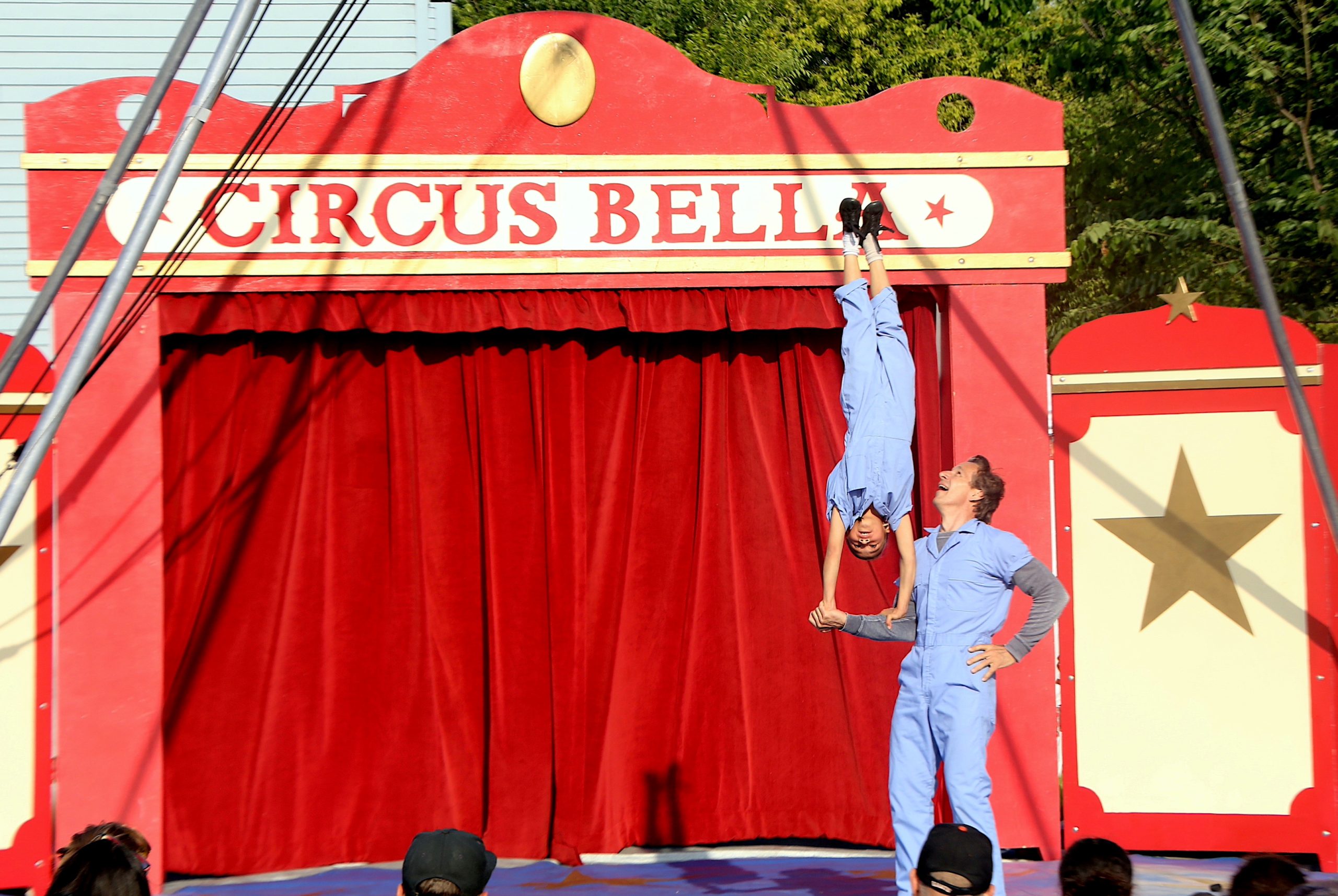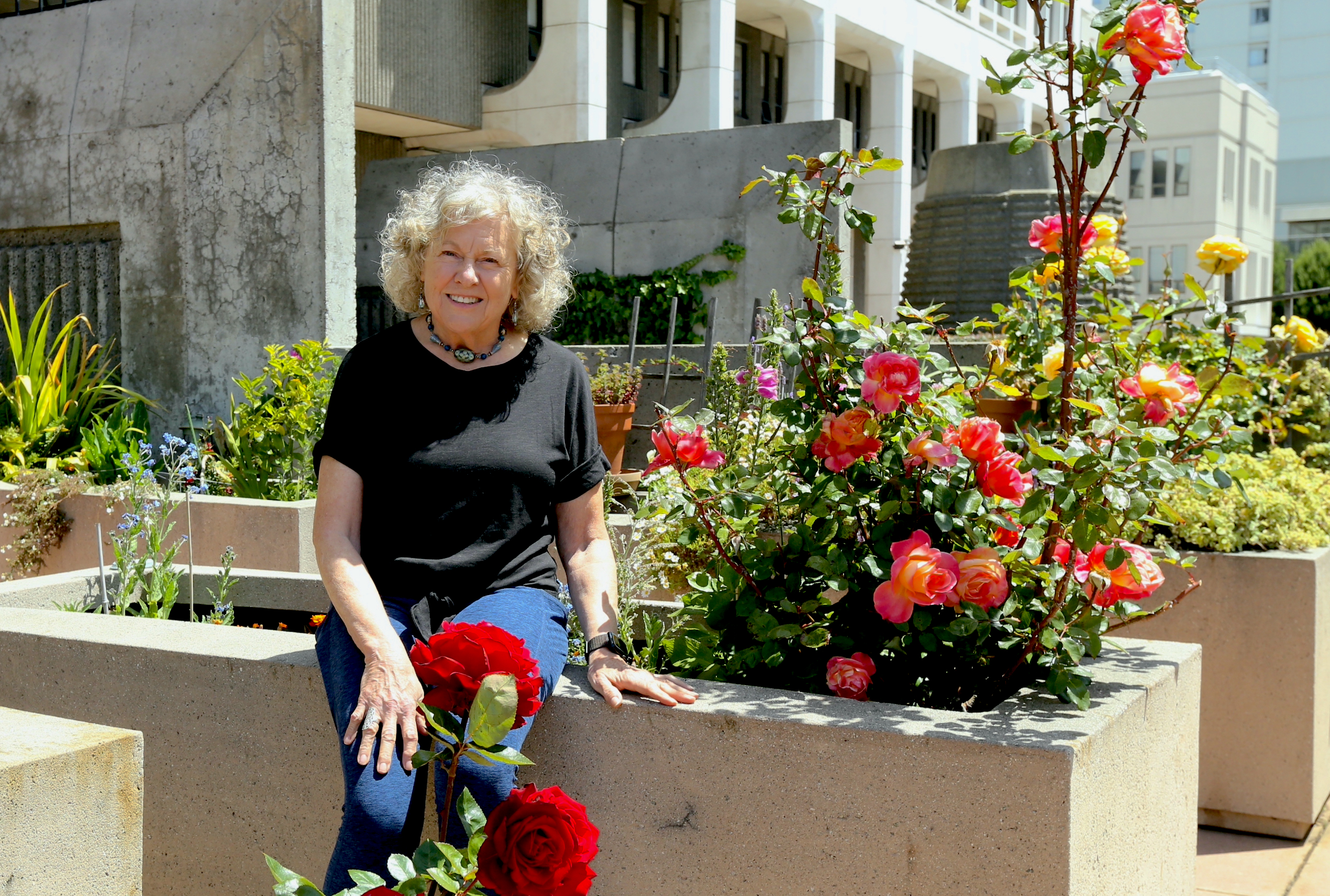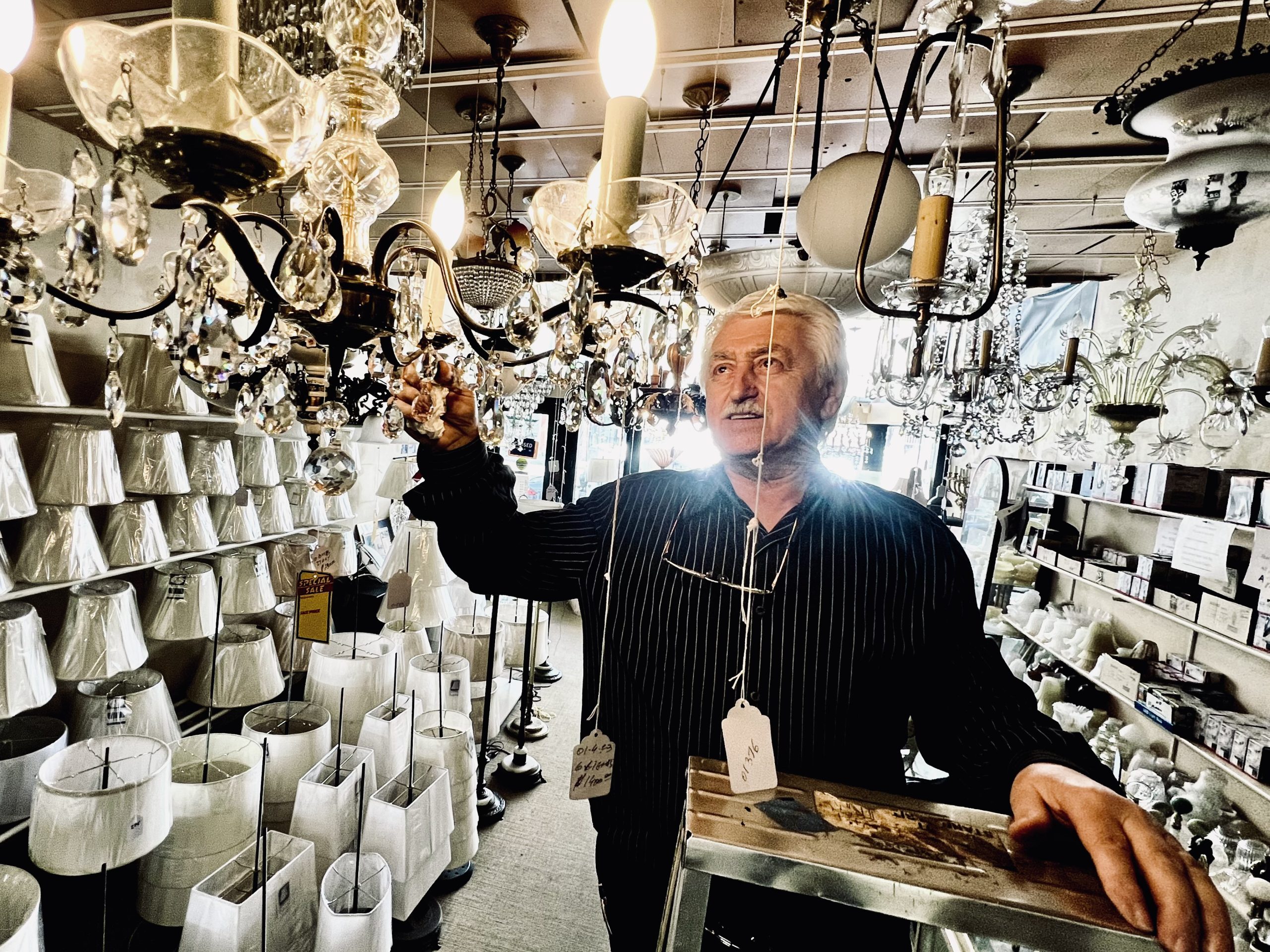Clowning, singing and comedic skits keep “free spirit” in good spirits
As a teenager in the ‘50s, Juanita Rusev dreamed of becoming an actress in the mold of Marilyn Monroe or Audrey Hepburn. But she didn’t think she had what it takes. “I thought actresses had to be beautiful,” she said, “and I was average looking, big, gangly, and unconfident.
So, she put aside that dream and focused on another passion – singing – by joining the glee club.
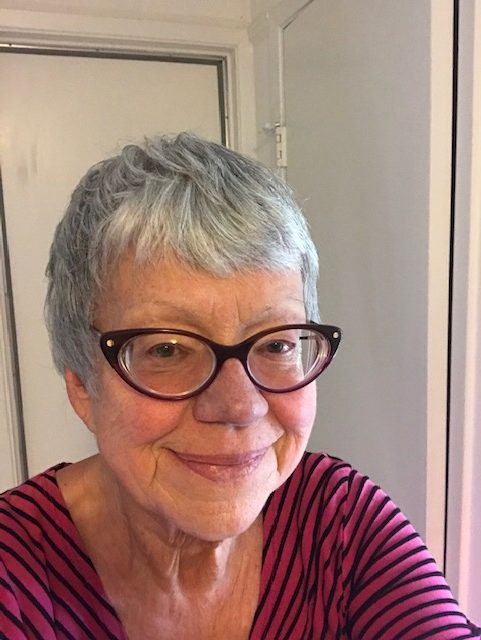
“I did get my first exciting taste of theater from my senior English teacher when I memorized and recited a Lady Macbeth monologue in front of the class,” Rusev said.
Still, she never became a professional performer. But since her late 40s she’s devoted herself to studying singing, acting, clowning, skit writing and musical theater. She taught high school for 16 years, continues to perform in local theater groups and puts on shows for community groups. And she still makes the three-hour trek to Laytonville, Calif., each summer to study, perform and frolic at Wavy Gravy’s Camp Winnarainbow, an adult circus arts camp.
Rusev said she initially took the safe Catholic-girl path, graduating with a bachelor’s degree in English – 1964 from San Jose State University – and marrying her college sweetheart. But discovering they were better as friends, they divorced after three years.
Breaking out
Newly single, she embraced the values of San Francisco’s Summer of Love. She met a lot of hippies and musicians, smoked marijuana and tried LSD, breaking through the guardrails of her conventional upbringing.
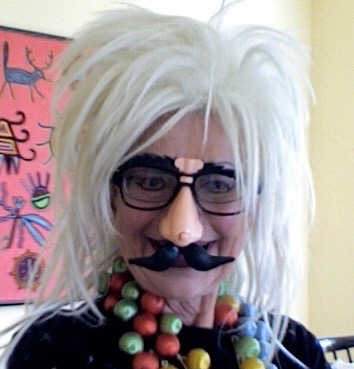
Her new lifestyle, she said, “freed me from the traditional roles women played in the 1940s and 1950s. I knew I didn’t want the family life. I dated a lot of very different men, discovering more and more about myself. I became a free spirit and it lasted.”
For the next 22 years. Rusev supported herself with a series of temporary jobs that took her up and down the West Coast. They included resident counselor in the Job Corps in Astoria, Ore., and job counselor for California’s State Employment Service at the Log Cabin Ranch for juvenile offenders in La Honda, Calif.
At 46, heeding a friend’s cajoling, Rusev embarked on something she had long thought about –she went back to school to get her teaching credential. For the next 16 years, she taught English at Galileo and South San Francisco high schools, retiring in 2003.
But it wasn’t her professional life that gave Rusev, now 80, the most joy. Clowning, humor and singing, she said, have been the keys to her happy life.
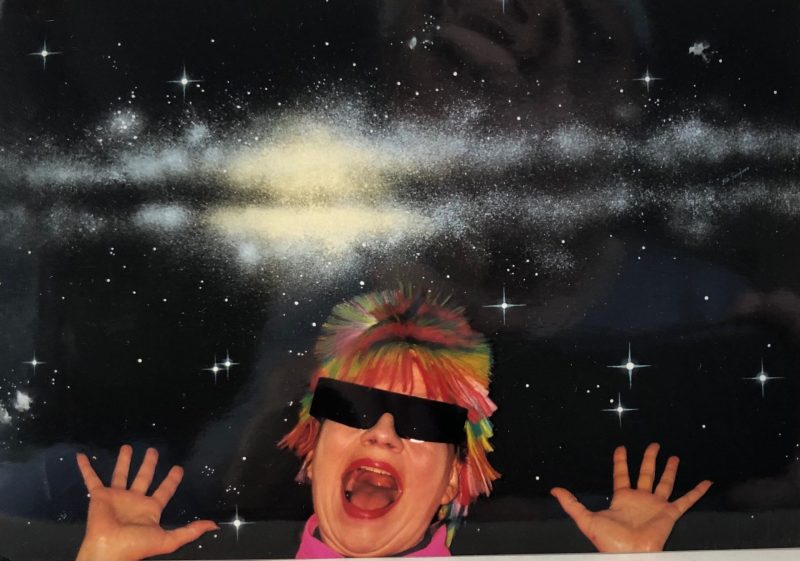
She grew up in a family that relished songs, humor and adventure. Both sets of grandparents immigrated to Chicago from Preko, on the Ugljan island off Croatia. When the family gathered, Croatian folksongs were sung heartily, Rusev recalled
Father was funny
When Rusev’s father was in his mid-teens during the Great Depression, he dropped out of high school, and finding no employment, rode the rails out to California and fell in love with the beauty of the undeveloped Santa Clara Valley. He secured a job as a machinist and moved his family to San Jose.
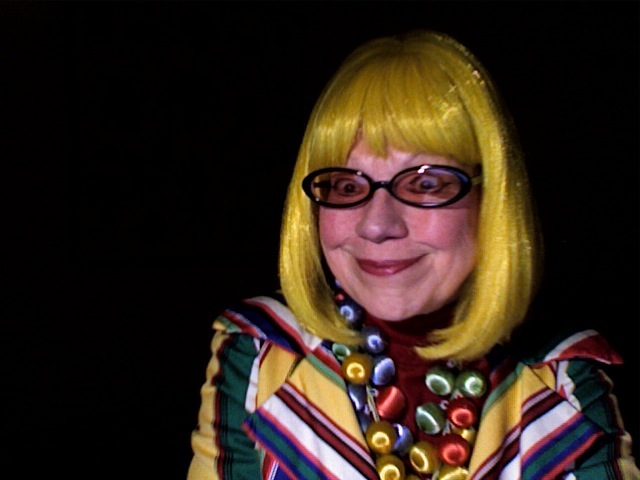
“My father was funny,” Rusev said, “When I went to retrieve my washed bra from the shower rack, two oranges fell out of it.” Her father told the younger two kids they were born on the compost heap next to his prolific organic garden in San Jose. “I think I’m healthy from all the arugula I ate as a teenager,” she said.
As a teenager, she loved going to see the music icons of the day: Ray Charles, Buddy Holly, The Big Bopper, Richie Valens, Fats Domino, The Platters, and Chuck Berry.
Decades later, Rusev began taking acting lessons at the Jean Sheldon studio in San Francisco. “Acting skills helped me work on a stage – in clowning, stand-up comedy, even in singing,” she said. “The best singing is done if one understands the feelings behind the lyrics and shares those feelings with the audience.”
‘I don’t have to grow up’
While teaching high school, she saw an ad for Wavy Gravy’s adult circus arts camp, Camp Winnarainbow. “Wow!” she said, “That’s it! I may be aging but I don’t have to grow up!”
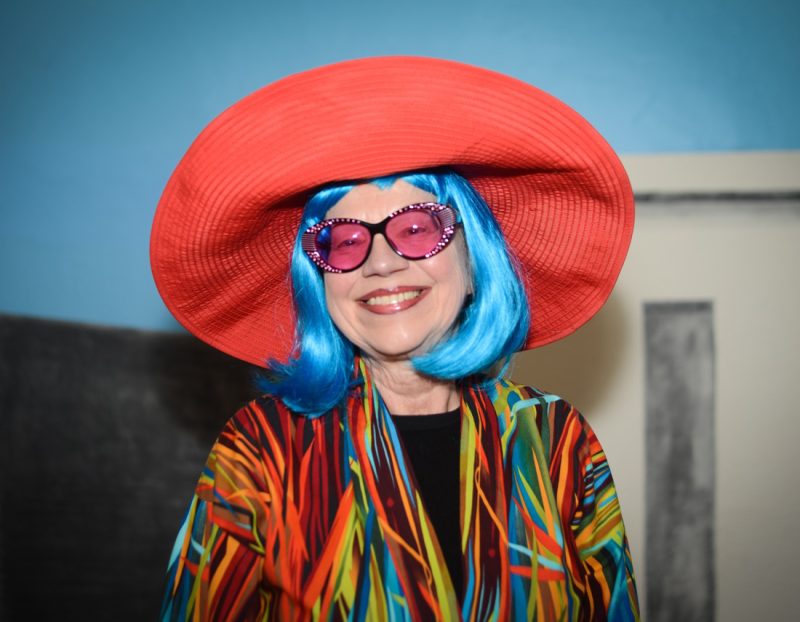
Wavy Gravy, a comedian, poet, hippie, political activist and Merry Prankster taught improvisation and clowning in his class sessions and gave talks every morning. Besides taking clowning classes, Rusev studied tap dancing, hip hop, improvisation, and musical theater.
The people who were part of Wavy Gravy’s tribe of Hog Farmers – a group of friends who worked on a hog farm — were the most sweet-natured people I ever knew, she said. Rusev slept in a tepee with other campers and ate organic food grown at the campsite.
“From Wavy, I learned how clowning can be a force in society to do good by opening up your heart to honor all people you meet,” Rusev said, adding that with her identity hidden, she’s freer to act spontaneously.
“It brings me so much joy to dress up in a wild costume – masks, wigs, make-up, hats – and engage in wild physical action,” she said. “I can act goofy, exaggerating all sorts of human behavior to allow my audience to release stress by laughing at their foibles.”
She’d share her comedy with friends at parties, performing short skits and spontaneous routines.
Rusev deepened her theatrical skills at the Stagebridge Performing Arts Institute in Oakland and plans to go back when in-person classes resume. She credits her singing coach there – Richard “Scrumbly” Koldewyn, a core member of the gay Cockettes theater group – with building her confidence
Songs conquer sadness
“Scrumbly would play the piano and we would sing one at a time,” Rusev said. “He wrote a song for me, ‘I’m a Walking, Talking Oxymoron.’ ” The first time he accompanied her, she opened her mouth and nothing came out. “He got up from the piano and hugged me until I got over my stage fright.”
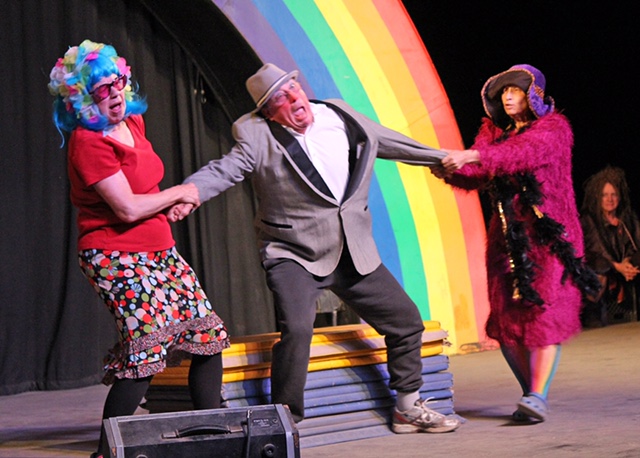
Singing always came naturally to Rusev, who has a deep alto voice. She favors uplifting songs. like the Beatles “Imagine” and “With a Little Help from my Friends.” In 2017, she was part of a performing group that sang Beatles songs monthly to patients at Laguna Honda Hospital.
She also likes songs that convey the joys of being alive like Cole Porter’s “You’re the Top.” She said she wrote her best skit, performed at Camp Winnarainbow, based on the song “Makin’ Whoopie.” It was about two lovers whose tryst gets interrupted by a seducer.
Rusev breaks into song whenever the spirit moves her, often while walking. “I sing a couple of lines to cats and dogs I meet in passing, and to people I feel need a little cheer,” she said.
Humor and clowning have helped Rusev get past life’s rough spot whether it was like struggling to maintain discipline in her classrooms or coping with a diagnosis of breast cancer, she said. “Humor is my armor against the slings and arrows of fate we all experience.”


